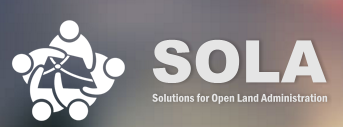Focal point
Location
Solutions for Open Land Administration (SOLA)
In December 2012, the Food and Agriculture Organization of the United Nations (FAO) successfully concluded the Solutions for Open Land Administration (SOLA) project. The 2.5 year project was funded by the Government of Finland and dedicated to implementing an open source computerised cadastre and registration system that is both affordable and sustainable in the context of developing countries. The open source software produced by the SOLA project (also called SOLA) was based on international good practice for service delivery, responsible governance of tenure (including transparency of process and transparency of tenure details), robust data management and the need for enterprise scale software. The underlying data structures used by the SOLA software are also based on the Land Administration Domain Model (LADM), now published as ISO 19152 by the International Organization for Standardization (ISO).
As the laws and practices governing land administration are often unique to a country, SOLA was designed to be customisable so that it could appropriately reflect the laws and practices of the host country. To test the effectiveness of the software and the approach used for customisation, the SOLA project included three pilot implementations in Ghana, Nepal and Samoa. Each pilot implementation was undertaken by a team of local software developers who were first trained by an FAO SOLA mentor so they could undertake the required customizations, support the pilot implementations and maintain the software. Each pilot presented its own challenges with many lessons learned by the FAO SOLA Team along the way.
Along with the Samoa Ministry of Natural Resources and Environment and the Nepal Ministry of Land Reform and Management there are now seven operational implementations of SOLA including the Lesotho Land Administration Authority, the Tonga Ministry of Lands, Environment, Climate Change and Natural Resources and implementations supporting systematic land titling and registration work in Ondo, Kaduna Kano and Kogi States (Nigeria). Various extensions to the original SOLA software have been developed through these implementations including support for systematic registration, lease management, inclusion of orthophoto layers and an interface to finance systems.
Interest in SOLA continues to grow and FAO has continued to support SOLA through the assistance available to countries wanting to implement the Voluntary Guidelines on Responsible Governance of Tenure (VGGT). In this new context, SOLA is seen as an excellent example of an enabling technology that improves transparency and service delivery in land administration agencies – key elements to improve land tenure governance. The European Union has offered its support through the VGGT by funding the Arabic, French and Russian versions of SOLA as well as the preliminary work for the Mass Property Valuation extension. Spanish, Portuguese and Chinese translations of the original SOLA software (now called Registry) are also available

